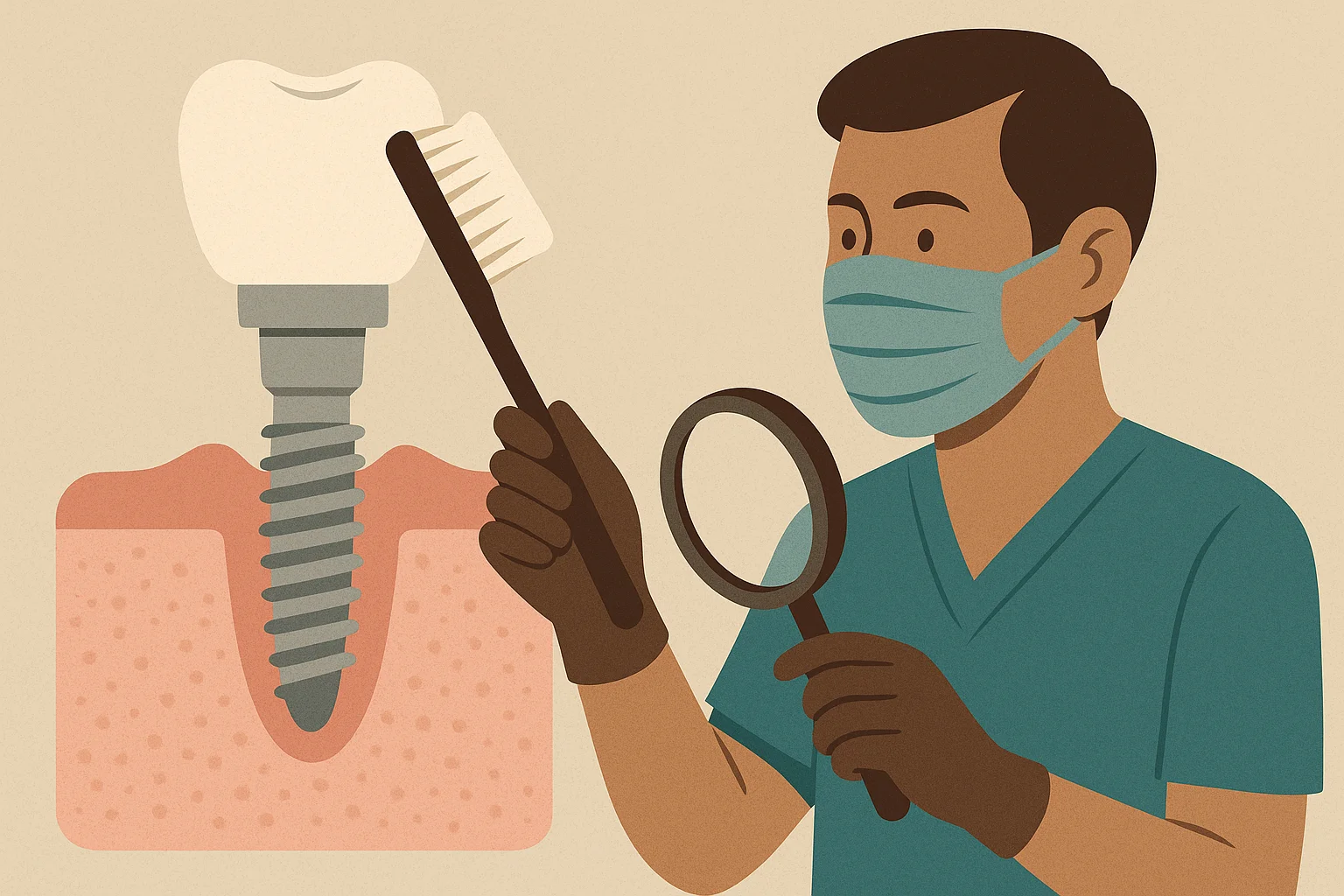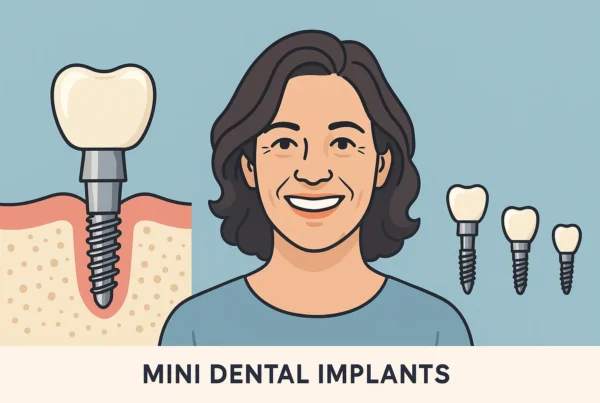Maintaining dental implants is essential for their longevity. It requires a consistent care routine, early awareness of potential problems, and regular professional checkups. Each of these components plays a vital role in preserving both dental health and the durability of the implant.
A thorough daily cleaning routine is critical. This means brushing and flossing carefully around the implant to prevent bacterial buildup that can lead to gum disease. Using dental products specifically designed for implants ensures safe and effective cleaning without damaging the implant.
Being alert to signs of complications is also important. Discomfort, swelling, or any shifting of the bite can signal a problem. Recognizing these early symptoms allows for prompt action and can prevent more serious issues.
Routine dental visits are equally vital. These appointments provide opportunities for professional cleanings and examinations, helping to detect problems early and adjust care plans as needed. Implant teeth require regular maintenance and monitoring, just like natural teeth.
Effective Maintenance for Implant Durability
Keeping dental implants in excellent condition involves regular cleaning, avoiding damaging habits, and attending consistent professional checkups.
The foundation of implant maintenance is daily hygiene. Using an appropriate electric tor soft bristle toothbrush or tools like interdental brushes and water flossers helps remove plaque and prevents infections like peri-implantitis.
Avoiding certain habits also plays a big role. This includes steering clear of chewing hard foods or using tobacco, which can stress implants and contribute to failure. Eliminating these risks helps extend the life of implants.
Lastly, professional oversight is crucial. Regular cleanings and checkups ensure early detection of any issues and allow dental teams to recommend updates to care routines, reducing the risk of complications.
Caring for Dental Implants: Recognizing Special Needs and Risks
Dental implants require unique care due to their structure and the way they integrate with gums and bone.
One special consideration is biofilm buildup. Implants are more susceptible to bacterial accumulation, so patients must use products that clean thoroughly without damaging the implant surface.
Unlike natural teeth, implants connect to the gum differently. This area can easily trap bacteria, making gentle and precise cleaning techniques essential to maintain gum health.
Bone loss around implants is another concern. It often goes unnoticed until it threatens implant stability. Regular dental checkups, including imaging, are necessary to monitor bone levels and prevent deterioration.
Optimizing Daily Dental Implant Care
A specialized daily care routine is essential to protect dental implants. This includes careful brushing, detailed flossing, and choosing the right hygiene products.
Brushing should be done twice daily with a soft-bristled or electric toothbrush. Gentle circular motions clean effectively without scratching the implant surface.
Flossing should include implant-specific floss, interdental brushes, or water flossers. These tools clean around the implant and remove plaque where regular floss might not reach.
Selecting non-abrasive dental products is just as important. Toothpastes and mouthwashes designed for sensitive teeth or implants protect against damage and bacterial colonization.
Nurturing Implant Health: The Role of Dental Professionals
Dental professionals are key to implant success. They provide expert cleaning, early diagnosis of potential issues, and personalized care plans.
Professional cleanings use precision tools designed for implants. These remove plaque without damaging the implant.
Routine checkups allow for early identification of problems like inflammation, infection, or bone loss. Prompt treatment prevents more serious complications.
Customized care plans are tailored to each patient’s implant type, habits, and oral health status. This personalization ensures optimal care and long-term implant health.
Creating Personalized Plans for Dental Implant Care
Each patient’s implant care plan should reflect their unique risks, implant type, and lifestyle.
Dentists begin with a risk assessment, taking into account factors like the kind of oral bacteria you have in your mouth, your oral hygiene, smoking habits, and medical history. This allows for targeted preventive strategies.
Different implants may require different maintenance approaches. Some might be more prone to plaque or need specific cleaning tools.
A patient’s lifestyle also matters. Busy individuals may need streamlined routines, while others may follow more detailed protocols. Tailoring the plan increases compliance and success.
Proactive Management for Dental Implant Complications
Preventing implant failure begins with early recognition and swift action.
Signs of trouble like discomfort, redness, or implant movement should be monitored closely. Catching issues early allows for simple and effective treatment.
Patients should perform regular self-checks, staying alert to any changes in how their implant feels or functions.
If problems arise, prompt dental intervention is essential. Timely care prevents complications from escalating and helps preserve the implant.
Collaborative Implant Care with Professional Support
Professional support is vital for maintaining dental implants. Renew Dental offers education, personalized care, and ongoing follow-up to ensure long-term success.
Patient education empowers individuals with the knowledge to maintain implants at home and recognize warning signs early.
Customized guidance helps patients implement care routines that suit their lifestyle, habits, and implant type.
Regular follow-ups ensure continuous improvement and early problem detection, reinforcing long-term oral health strategies.
Timely Dental Interventions: Understanding the Signals
Knowing when to act is key to preserving implants. Dentists rely on signals from lifestyle factors, overall health, and symptoms around the implant site.
Lifestyle habits like smoking are red flags that may prompt more frequent visits or enhanced care protocols.
Medical conditions such as diabetes or osteoporosis can affect healing and bone support. These require personalized treatment plans to minimize risks.
Finally, signs from the implant site—such as swelling, looseness, or pain—warrant immediate professional attention to protect implant integrity.
Ensuring Long-Term Success of Your Dental Implants
The goal of dental implant care is lasting oral health. This involves daily at-home care, regular dental visits, and a collaborative approach between patient and provider.
Home care is the first line of defense. Proper brushing, flossing, and product selection guard against infections and plaque buildup.
Checkups offer the next layer of protection. Dentists use advanced tools to clean and monitor the implant more effectively than at home.
Working together, patients and Renew Dental ensure a consistent, informed strategy for maintaining implant health and longevity.
Don’t wait any longer for the smile you’ve been dreaming of. Contact Elaine Wu ReNEW Dental in Tewksbury, MA today! Call 978-451-1500 or visit our website to schedule your consultation.
Schedule your consultation today!
FAQs
How often should I schedule dental check-ups for my implants?
It’s generally recommended to visit your dentist every six months, but your dentist may adjust this based on your personal needs and risk factors.
Can dental implants get infected like natural teeth?
Yes. Implants can develop infections like peri-implantitis, which is similar to gum disease. Maintaining a proper cleaning routine and visiting your dentist regularly helps prevent this.
What are the best cleaning practices for dental implants at home?
Use a soft-bristled or electric toothbrush, floss specifically designed for implants, and non-abrasive toothpaste. Water flossers and interdental brushes can help clean hard-to-reach spots.
Related Articles
- Dental Implants
- Same-Day Dental Implants
- Affordable teeth implants
- Dental implants surgery
- Dentures with implants
- Full Mouth Dental Implants
- Mini Dental Implants
- Zirconia Dental Implants
See More Reviews From ReNew Dental Denture and Implant Center. View information about local places in our community. Get Driving Directions to Our Practice
If you’d like to get an estimate on your dental implants, take our implants quiz here.




